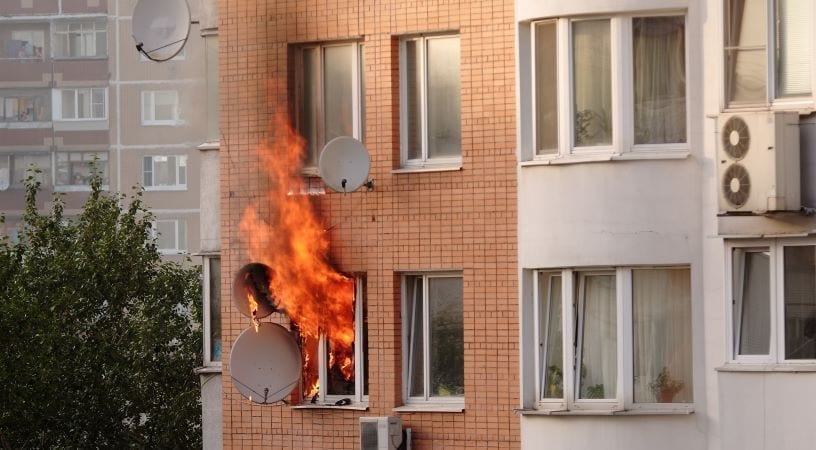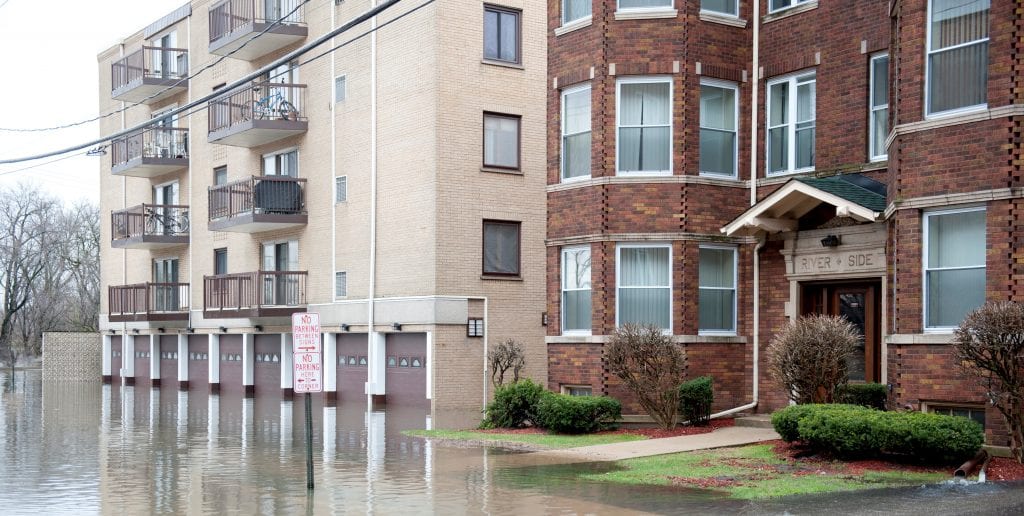
Like riding a bike without a helmet, renting an apartment without insurance is usually okay -- until something happens. That’s why most people consider these basic safeguards to be common sense coverage. And while renters insurance comes with a price tag, it’s a pretty small one that can end up saving you tens of thousands of dollars when something goes wrong.
That being said, deciphering all that small print in a renters insurance policy is never quite as straightforward as, say, riding a bike. That’s why we’re breaking it down for you by answering your biggest questions about renters insurance.
What is renters insurance, anyway?
That part is easy -- renters insurance is intended to protect the belongings of those renting homes or apartments in events such as fire, theft, or vandalism. Your landlord is responsible for insuring the building itself, but you’re generally on the hook if something happens to the items or guests visiting inside your apartment unit or rented home.
Is renters insurance required?
Legally speaking, no. The rental police won’t come after you if you don’t have a policy. And, unlike mortgage lenders who require recipients to have homeowner’s insurance, no such requirement exists for renters. However, some landlords and management companies do require their tenants to have renters insurance, in which case you’ll need to insure up. A good time to get insurance is when you’re planning a move. That way, if you already have a policy, then it won’t delay your lease approval process. You just need to give your insurance company your new address.

as well as the cost of temporary housing.
Should I get renters insurance?
Even if your property manager doesn’t request that you insure your apartment, it’s a really good idea to be insured for your own protection. Think about it like this: Do you have cash on hand to replace everything you own in the event of burglary or fire, pick up someone else’s hospital bills if they injure themselves in your home, or pay for a hotel room for days on end if your apartment becomes temporarily inhabitable? If not, you should probably invest in renters insurance.
How much does renters insurance cost?
Generally, the average cost of renters insurance is fairly low, at about $10-$25 per month, or $120-$300 per year. Various factors will affect how much you pay, including:
- Where you live
- Whether you rent an apartment or a single-family home
- If you opt for cash value or replacement cost value for your personal property
- How much coverage you need for your property and liability
- Your deductible amount
The more you need to pay if something goes wrong (a higher deductible), the lower your premium or monthly payment. A lower monthly payment is great, but you want to set a deductible that makes sense for you. Say you travel frequently, and your luggage has been stolen before. If your deductible is $500, but everything in your suitcase is only worth $450, it wouldn’t make sense to file a claim. Instead, you might consider paying slightly more each year for a $250 deductible, which would help pay for your lost items.
What does renters insurance cover?
The umbrella of renters insurance can protect tenants in a few different ways:
- Personal property: Your laptop, your sofa, your clothes -- if any of your things are lost or damaged due to a laundry list of unfortunate events (including fire, smoke damage, vandalism, and theft), your insurance will reimburse you after you pay the deductible.
That safeguard extends beyond the walls of your address to go wherever your belongings go. Are you keeping them in a storage unit while you’re in the process of relocating? Covered. What if you’re on a vacation, and your Nikon digital camera is stolen from your hotel room? Covered. Or, while you’re on that trip, a leaky ceiling wrecks the laptop you left in your room back home? All set. Even if someone breaks into your place and steals a credit card you left behind to go on a fraudulent shopping spree, renters insurance can kick in. You just need to decide which of the two types of coverage you want:
- Cash value: If your 5-year-old computer is stolen and you have a cash value policy, the insurance company will pay you only what it would be worth today. Taking into account the decade of depreciation, that could be significantly less than what you once paid for it.
- Replacement cost value: This approach means that the renters insurance company would give you enough money to buy a computer of that same type today. Since this kind of coverage has a higher monetary value, you can expect to pay a higher premium or monthly payment.

if someone is injured while visiting your home.
- Personal liability: Let’s say you’re having some friends over when your Golden Retriever darts in front of a guest, causing them to trip and fall, resulting in a serious back injury. It doesn’t matter how passionately you swear that Roofus would never hurt a fly -- you could be held responsible for those medical bills or wages lost if the fall prevents them from working. With renters insurance, though, your insurance would cover your friend’s costs in that scenario, or any time someone sustains an injury on your premises.
- Loss of use: What do you do if a fire breaks out in your building, leaving your home unlivable for a while? Renters insurance can cover any out-of-the-ordinary costs that come up as a result of that loss of shelter, like a hotel room and food charges.

What’s not covered by renters insurance?
Equally as important as understanding what renters insurance protects, is knowing what your policy doesn’t cover. To fully understand these exclusions, you’ll want to carefully read through your policy and contact your insurance provider with any specific questions. But generally speaking, these are some liabilities that renters insurance tends not to protect against:
- Some natural disasters: If a flood, sinkhole, or earthquake strikes your apartment, renters insurance won’t guard against those damages. For those living in regions where these events are uncommon, this lack of protection might not be a cause for concern. If you live in an oceanfront property or an earthquake-prone zone, though, you might want to think about investing in separate coverage for specific disasters.
- Mold: Damage caused by mold can be a tricky issue for both renters and homeowners insurance. Many policies have specific exclusions on mold damage or include caps on coverage. It also depends on what caused the mold. For example, if the mold damage was caused by something like a burst pipe or leak, renters insurance will usually cover that unless there’s an exclusion. However, if the mold is caused by one of the uncovered natural disasters, you’d be out of luck.

- Some dogs: Exotic animals and even some types of dogs are excluded from many renters insurance policies. You should read your particular plan to see which pups aren’t accounted for, but commonly uncovered breeds include Pit Bulls, German Shepherds, Great Danes, and Bulldogs. If you have one of these dogs, you should seek out a policy that accommodates them or doesn’t specifically exclude certain breeds.
- Certain expensive items: Some pieces of personal property, such as jewelry or valuable collectibles, have monetary caps on them, meaning the insurance company will only pay up to a certain amount, even if they cost you more than that. If you’re twisting your five-carat diamond ring as you read this, or glancing over at the Picasso hanging on your wall, for instance, you should definitely insure those separately. The good news is that you can add so-called endorsements onto your renters insurance, so that you’ll pay extra to increase the reimbursable value of your beloved belongings.
How much renters insurance do I need?
Maybe you’re a recent grad living in a pint-size apartment and you’re looking around at your well-loved mix of second-hand and Ikea furnishings and thinking, “None of this is really worth that much.” Or, maybe you’re living in a swanky penthouse or renting a spacious home filled with high-end furnishings and expensive fashions. No matter the situation, tally up the total monetary value of everything -- from your coffee maker, to your clothing, to your couch -- and insure your personal property for at least that much. It’s not really about how valuable your assets are, it’s about whether you’d comfortably be able to pay to replace everything or live somewhere else temporarily if something out of your control happens.
How much renters insurance you need depends on your specific situation, but a useful benchmark is $30,000 of personal property coverage and $100,000 of liability coverage, which on average, translates to $12 to $15 a month for a deductible of $250.
Is renters insurance worth it?
With all of this in mind, that’s really up to you to decide. But like us, you’d probably agree that peace of mind and the knowledge that you’ll have the financial resources you need if something goes wrong is well worth the price of a few cups of coffee each month.
Speaking of insurance, if you’re relocating, you can find out about protecting your property during the process with our Moving Insurance Guide.
Sofia Rivera is a Boston-based lifestyle editor and frequent contributor to the PODS Blog. Her work has appeared in Boston magazine, Apartment Therapy, and more. You can most often find her redecorating her apartment, trying out a new recipe, or trekking all over the city.

Your quote in 60 seconds
Get pricing tailored to your needs!








